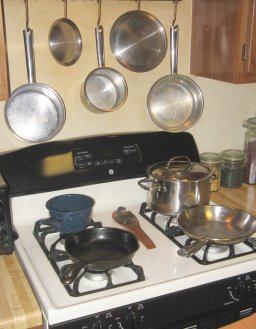|
Health Issues...Threats To Your Health Around The HouseMost people who chose to adopt a vegetarian diet do so for health issues of one kind or another. They may want to lose weight, avoid illness and diseases or just plain feel better physically. These are noble and easily attainable goals for anyone who diligently follows through with becoming vegetarian. But there are other health issues beside avoiding an unhealthy dietary regimen that can threaten our overall health and well-being. Toxic PlasticsPlastic storage containers, bottled water and other beverages, plastic food containers, plastic bottles, tubes and jars for personal hygiene products, plastic toys etc., are all potential sources of toxic plastics. Just recently there was a national alert citing concerns about plastic baby bottles. The leading culprits in all of these examples is a triad of compounds called "bishenol-A" (BPA), "polyvinyl chloride" (PVC) and "Phthalates". These compounds are potentially dangerous, especially to babies and children, because they mimic naturally occuring hormones that our bodies produce. Also known as "endocrine disruptors" they can upset our natural hormone balance if consumed or absorbed through the skin. A growing number of health issues is being attributed to these plastic compounds. Most food containers made of plastic have a special symbol that can be found on the top or bottom of the container. This symbol is a triangle with a number inside. Generally, containers numbered 1, 2, 4 or 5 are safe to use while containers numbered 3, 6 or 7 should be avoided. For more in-depth information on this subject you can consult this website devoted to Bad Plastics. Cookware
Designer stovetop cookware is all the rage these days. There are lots of choices out there and much of it can be quite pricey. In our meatless kitchen we're more concerned with health issues than whether our pots and pans were featured in the latest cooking magazine article. The cooking surfaces of most modern cookware are usually made with one of five products; stainless steel, aluminum, wrought iron, enamelware or non-stick coatings. In our opinion, it is best to avoid cooking with aluminum and non-stick coated cookware. Aluminum pots and pans are comparatively inexpensive but aluminum reacts with acidic foods like tomatoes or vinegar. Unfortunately, many restaurants still use aluminum cookware because it is inexpensive and lightweight. But aluminum residues have health implications associated with Alzheimer's disease and certain forms of cancer. Specially made anodized aluminum cookware is advertised to be non-reactive like stainless steal but it can be even more expensive. Wrought iron cookware will also react with acidic foods to a lesser extent but there are not any serious health issues with iron residues that we're aware of. Many non-stick coated cookware surfaces contain a group of chemicals called "perfluorinated compounds" (PFCs) and are now coming under scrutiny since it is known that, as forms of plastic, they become reactive with foods when heated. Many of these plastic coatings have been found to interfere with the body's hormone balance and may have long term undesireable health effects on the body if consumed. We recommend avoiding the aluminum and non-stick cookware and opting for non-reactive stainless steel cookware if you can afford it. Enamelware or wrought iron is also acceptable. Aluminum FoilThis versatile product boasts a seemingly never-ending variety of possible uses. However just like pots and pans made of aluminum, foils should not be used in certain kitchen preparations. Aluminum reacts with acidic foods, especially when heated. If you are preparing anything containing tomatoes, citrus, vinegar, etc., it's a good idea not to use foil for cooking on the grill or baking in the oven, even though it helps to make cleanup easy. Doing so can lead to the consumption of aluminum compounds that may be absorbed by the body and contribute to serious health problems like Alzheimere's disease and cancer. Microwave OvensThe safety of microwave ovens has improved greatly over the years. They are especially useful for thawing frozen foods. However cooking foods in a microwave oven is less desireable than convential cooking on the stovetop or in the oven. The timing of cooking different foods in a microwave must be exact to produce an acceptable result. And much of the time the textures of the foods being prepared are less desireable than cooking the same foods "the old fashioned way". But this is simply our preference rather than a health issue. However in our opinion plastics, including the so-called "microwave safe" plastics, should not be used for cooking in the microwave. It is simply too easy to overcook and overheat them to the point where they begin to melt or bubble and impart plastic residues into the foods being prepared. We recommend avoiding microwave prepared foods when possible. If you are using a microwave oven for cooking, use paper products, glassware or ceramic kitchenware instead of plastic containers. Are you aware of a potential home health hazard?This is the place to share it with the world. Your information can benefit all who read about it here. What Other Visitors Have SaidClick below to see contributions from other visitors to this page...
Drink Plenty Of Water...Not Chemicals Not rated yet Return to Vegetarian Lifestyle from Home Health Issues
|
